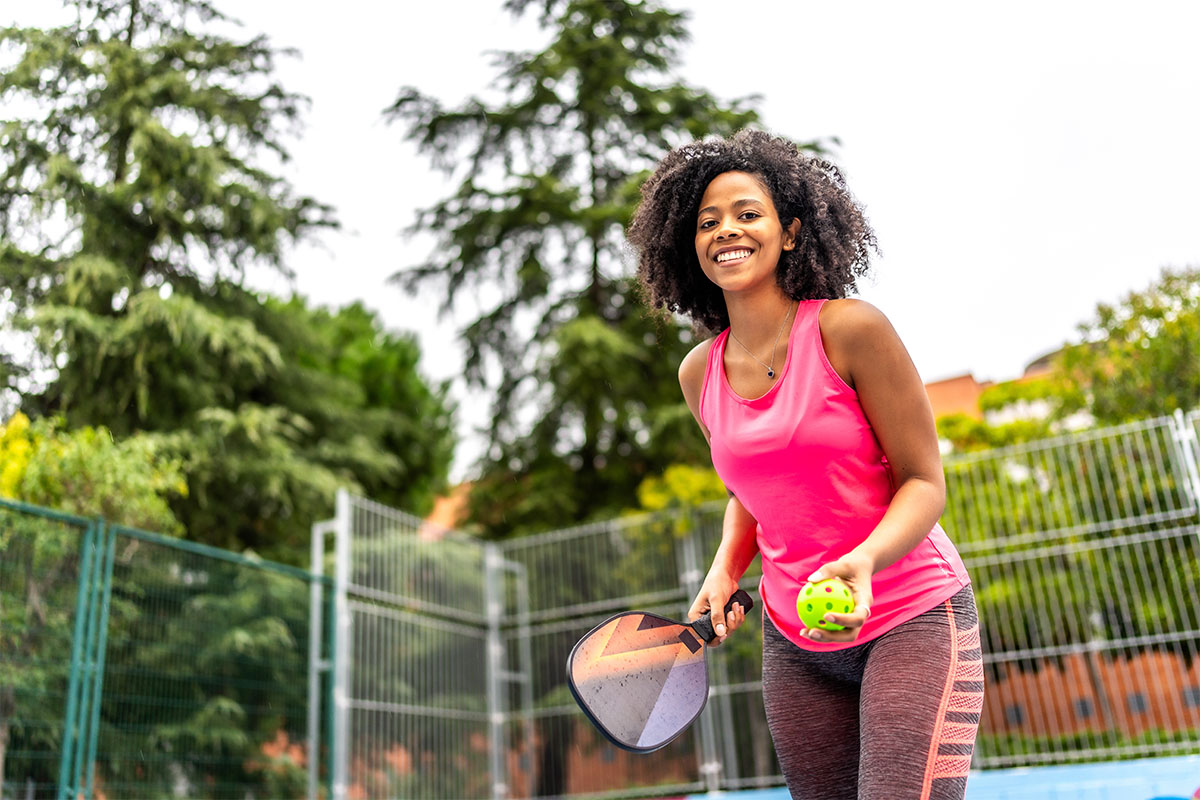Pickleball for Parkinson’s: Friendly Fun and Fitness

Pickleball—one of the fastest-growing sports in the United States—is gaining attention not just for its fun, social aspects but also for its potential health benefits. For individuals living with Parkinson’s disease (PD), pickleball may offer a unique combination of physical, cognitive, and emotional benefits.
What Does the Research Say?
Emerging evidence suggests that pickleball can be a supportive tool in managing Parkinson’s symptoms.
Studies indicate that participation in this low-impact sport can lead to:
- Improved balance, coordination, and motor function: Pickleball involves repetitive movement patterns and footwork drills that may support neuromuscular control and agility. These elements are crucial for individuals with Parkinson’s, who often experience gait disturbances and postural instability.
- Cognitive stimulation: The game requires split-second decision-making, strategy, and hand-eye coordination, which may stimulate executive function and delay cognitive decline.
- Mood enhancement: Engaging in a fun, goal-oriented activity like pickleball can boost mood and decrease symptoms of depression and anxiety—common challenges in Parkinson’s.
- Social connection: Pickleball’s inclusive and doubles-friendly format fosters community engagement, which is a key factor in overall well-being and emotional health.
How to Get Started
Starting a new activity with Parkinson’s can feel intimidating, but pickleball offers a flexible entry point for all fitness levels.
Consult with your physician and a physical therapist and/or occupational therapist to determine your readiness to play some friendly pickleball.
Injury Prevention Tips
As with any physical activity, safety is key—especially for those managing Parkinson’s. Pickleball injuries commonly include ankle sprains, shoulder strains, and falls.
Some preventative strategies may include:
- Supervised instruction: Beginners may benefit from working with a coach or physical therapist or occupational therapist familiar with Parkinson’s-friendly pickleball modifications.
- Warm up properly: Begin with dynamic stretching and light aerobic movement to activate your upper and lower body.
- Stretch regularly: Incorporate flexibility exercises before and after play to reduce stiffness and improve range of motion.
- Balance training: Incorporate balance exercises into your weekly routine to reduce fall risk.
- Start slow: Build up stamina and skill gradually. Begin with short sessions and progress as tolerated.
- Play doubles first: Doubles games reduce court coverage, minimizing overexertion and fall risk.
- Listen to your body: Avoid pushing past fatigue or pain. Modify play intensity as needed.
- Stay hydrated: Dehydration can affect cognition and increase fatigue—keep a water bottle handy.
- Stay sun-smart: Indoor courts are a great place to start. If you're playing outside, aim for early morning or late afternoon games to avoid peak sun. Don’t forget a wide-brim hat, sunscreen, and UV-protective clothing.
- Protect your eyes: Wear sport-specific eyewear to guard against potential injuries from fast-moving balls.
- Proper footwear: Choose court shoes with good lateral support.
Helpful Resources
- Pickleball 4 Parkinson’s: A nonprofit dedicated to supporting the Parkinson’s community through pickleball events, education, and outreach.
- USA Pickleball: The national governing body for the sport, offering rules, tutorials, and local club directories.
Final Thoughts
While not a replacement for traditional medical care or physical therapy and occupational therapy, pickleball offers a fun, social, and health-promoting activity that aligns with lifestyle medicine principles. For individuals with Parkinson’s, it can be a joyful way to maintain mobility, stimulate the mind, and connect with others. Remember, always consult your healthcare provider before beginning a new physical activity program.
References
- Azar FM, Lamplot JD, Bernholt DL, Spence DD. Pickleball: a standard review of injury prevalence and prevention in a rapidly growing sport. J Am Acad Orthop Surg. 2024;15;32(22):e1130-e1141.
- Cerezuela JL, Lirola MJ, Cangas AJ. Pickleball and mental health in adults: A systematic review. Front Psychol. 2023;14:1137047.
- Midwestern University News. MWU, Creighton University Partner on PT Study for Parkinson’s Patients and Pickleball. 2025. Accessed from https://www.midwestern.edu/news-stories/mwu-creighton-university-partner-pt-study-parkinsons-patients-and-pickleball
- Nesbit J, McIsaac TL, O’Neal S. et al. Rallying against Parkinson Disease: Exploring the therapeutic impact of pickleball [Poster Presentation from Creighton University]. American Physical Therapy Association, Combined Sections Meeting. Houston, Texas. February 14, 2025. Accessed from https://apta.confex.com/apta/csm2025/meetingapp.cgi/Paper/44927
- Stroesser K, Mulcaster A, Andrews DM. Pickleball Participation and the Health and Well-Being of Adults—A Scoping Review. J Phys Act Health. 2024 Jul 18;21(9):847-860.
- Waisberg E, Ong J, Lee AG. Pickleball eye injuries: Ocular protection recommendations and guidelines. Eye (Lond). 2024;38(6):1039-1040.
- Written by Ziya “Z” Altug, PT, DPT, MS, DipACLM, OCS
Donate Today,
Change Lives Forever
PCLA is powered by generous contributions from people like you.
Please consider donating today so we can continue to provide critical support to those impacted by Parkinson’s.

